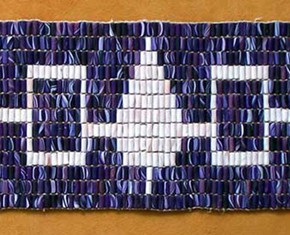The views expressed in our content reflect individual perspectives and do not represent the authoritative views of the Baha'i Faith.
Unto every father hath been enjoined the instruction of his son and daughter in the art of reading and writing and in all that hath been laid down in the Holy Tablet…. He that bringeth up his son or the son of another, it is as though he hath brought up a son of Mine; upon him rest My glory, My loving-kindness, My mercy, that have compassed the world. – Baha’u’llah, The Most Holy Book, p. 37.
The prophets of God, Baha’is believe, are remarkable human beings. They receive revelations directly from God. They tell forth the truth. They also foretell the future prophet to come. As the voice of God in their respective day and age, the prophets of God speak to all humanity. At the same time, some, if not most, of the Prophets of God fathered children.
Even though the prophets are more than human, the fact that some of them had sons and daughters makes them more human, more “real” to us. We fathers and mothers can personally relate to the love, burden, pain and joy of raising children, truly the most creative part of life.
So when a prophet of God gives personal advice to his sons, naturally that piques the interest of Baha’i fathers and mothers, charged with the sacred task of raising their sons and daughters to the best of their parents’ ability, so that each of these sons and daughters can contribute to society to the best of their ability.
One of the most celebrated writings of Baha’u’llah, prophet-founder of the Baha’i Faith, is this passage:
Be generous in prosperity, and thankful in adversity. Be worthy of the trust of thy neighbor, and look upon him with a bright and friendly face. Be a treasure to the poor, an admonisher to the rich, an answerer to the cry of the needy, a preserver of the sanctity of thy pledge. Be fair in thy judgment, and guarded in thy speech. Be unjust to no man, and show all meekness to all men. Be as a lamp unto them that walk in darkness, a joy to the sorrowful, a sea for the thirsty, a haven for the distressed, an upholder and defender of the victim of oppression. Let integrity and uprightness distinguish all thine acts. Be a home for the stranger, a balm to the suffering, a tower of strength for the fugitive. Be eyes to the blind, and a guiding light unto the feet of the erring. Be an ornament to the countenance of truth, a crown to the brow of fidelity, a pillar of the temple of righteousness, a breath of life to the body of mankind, an ensign of the hosts of justice, a luminary above the horizon of virtue, a dew to the soil of the human heart, an ark on the ocean of knowledge, a sun in the heaven of bounty, a gem on the diadem of wisdom, a shining light in the firmament of thy generation, a fruit upon the tree of humility. We pray God to protect thee from the heat of jealousy and the cold of hatred. He verily is nigh, ready to answer.
Thus hath My tongue spoken unto one of My Branches (sons), and We have mentioned it unto such of Our loved ones as have cast away their idle fancies, and clung unto that which hath been prescribed unto them in the day whereon the Daystar of Certitude hath shone forth above the horizon of the will of God, the Lord of the worlds. – Baha’u’llah, Epistle to the Son of the Wolf, pp. 93–94.
In the very same Tablet, Baha’u’llah also quotes from his Tablet to Diya, another son. The following is a provisional translation:
I exhort thee, as I have exhorted one of My Branches (sons), Díyá’u’lláh, as named by My pen in My Preserved Tablet:
O Díyá’! Be patient in hardship. In all thy affairs, be content. Place thy confidence in God, the Almighty. Be swift in beneficent deeds. To thy Lord be unreservedly obedient. Conceal always the faults of others. Shun ungodly desires. Tread unswervingly the path of truth.
Be thou a rain-laden cloud of bounty for all. Forgive the wrong and wayward deeds of others. Be thou firm in the Covenant and steadfast in the Cause of God. In such manner doth this Wronged One exhort you. I likewise enjoin upon you the fear of God. Be thou trustworthy and honest.
Upon thee be glory upon glory. Blessed art thou and whomsoever loves you for the sake of God. And woe betide those people who disdain you and who turn away from what hath been decreed in the Book. – Provisional translation from the original Arabic by Dr. Nosrat Mohammadhosseini, LL.D.
Every young man and woman, Baha’i or not, would do well to commit to memory Baha’u’llah’s “Be generous in prosperity” passage. No truer, more profound and noble advice to young people can be found. Making this passage part of one’s thoughts and actions is a sure way to find your own true self.
There is another famous writing of Baha’u’llah: the “Tablet of Ornaments.” Here, an ornament (“Taraz”) is a metaphor for a quality of sterling character. My dear wife, Nahzy, and I were moved and inspired to name our second son, Taraz, after this Tablet. To give you a sense of the nobility and grandeur of the “Tablet of Ornaments,” here is a passage:
The first Taráz and the first effulgence which hath dawned from the horizon of the Mother Book is that man should know his own self and recognize that which leadeth unto loftiness or lowliness, glory or abasement, wealth or poverty. Having attained the stage of fulfilment and reached his maturity, man standeth in need of wealth, and such wealth as he acquireth through crafts or professions is commendable and praiseworthy in the estimation of men of wisdom, and especially in the eyes of servants who dedicate themselves to the education of the world and to the edification of its peoples. They are, in truth, cup-bearers of the life-giving water of knowledge and guides unto the ideal way. They direct the peoples of the world to the straight path and acquaint them with that which is conducive to human upliftment and exaltation. The straight path is the one which guideth man to the dayspring of perception and to the dawning-place of true understanding and leadeth him to that which will redound to glory, honour and greatness. – Baha’u’llah, Tablets of Baha’u’llah, pp. 34–35.
















Comments
Sign in or create an account
Continue with Googleor